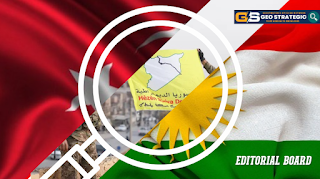Special/Editorial Board of Geostrategic Studies
At every critical juncture, when Kurds attempt to make a calculated political or strategic move, it seems the Turks are already miles ahead. This is not merely an observation rooted in pessimism or self-criticism; it is a structural truth that has shaped the modern Kurdish predicament. The Turkish state, armed with immense institutional power, geopolitical reach, and centralized resources, operates at a vastly superior capacity than any Kurdish actor—especially in Syria, where fragmentation and dependency have been recurring themes.
The repeated outcome is this: Kurds often find themselves excluded from meaningful equations, exiting high-stakes negotiations or regional transformations with nothing to show—empty-handed, politically isolated, or bound to alliances that ultimately disempower them.
This asymmetry, however, should not lead to defeatism. Instead, it demands a serious recalibration of Kurdish strategies in Syria—strategies that emerge from Kurdish realities, not borrowed ideologies or externally imposed frameworks.
The Imperative of a Syrian Kurdish Intellectual and Strategic Core
The first pillar of this new strategic vision must be the exclusive reliance on the Syrian Kurdish mind. While solidarity across the four parts of Kurdistan is a moral necessity, the political equation in Syria requires tailored solutions. The terrain, the demographic distribution, the historical experiences, and the dynamics of conflict and governance differ drastically from those in Iraq, Turkey, or Iran.
This means Syrian Kurds must start thinking for themselves—not in isolationist terms, but with the conviction that no one understands their social, cultural, and political reality better than themselves. The era of surrogate strategies must come to an end.
Reclaiming the Nationalist Discourse: From Abstract Universalism to Grounded Legitimacy
The second axis of this recalibration must be the abandonment of universalist, abstract ideologies that fail to resonate with the people or gain international sympathy. The heavy investment in revolutionary internationalism and utopian narratives has not translated into sustainable power or meaningful recognition.
Instead, a return to a legitimate, grounded Kurdish nationalism is necessary—not chauvinistic or exclusivist, but rooted in people’s lived experiences, history, and collective trauma. Nationalist discourse, when articulated as a struggle for dignity, recognition, and self-determination, garners both internal cohesion and external empathy. The world, even in its selective moralism, understands the language of national rights better than the language of ideological experiments.
Political Autonomy Beyond the PKK Paradigm
This leads us to the third and most delicate point: the need to define a uniquely Syrian Kurdish political path that is free from the direct imposition or overreach of the PKK. This is not a condemnation of the PKK’s history or struggle. On the contrary, the acknowledgment of its role in raising Kurdish consciousness is essential. However, the tactical, ideological, and organizational priorities of the PKK—born in a different geopolitical and historical context—should not dictate the political future of Syrian Kurds.
Respect does not mean submission. Solidarity does not mean uniformity.
For Syrian Kurds to achieve enduring self-governance, international legitimacy, and genuine societal support, they must develop independent institutions, a diversified political culture, and a strategic vision that reflects their unique circumstances.
A Final Word: The Real Battlefield Is Strategic Thinking
This is not a military competition. It is a strategic one. And in this strategic battlefield, intellectual depth, institutional capacity, and coherent national narratives are the real weapons.
The Turkish state moves faster not simply because it is more powerful, but because it is more centralized, more coherent in its objectives, and less distracted by borrowed ideologies. If Syrian Kurds continue to outsource their thinking, they will continue to lag behind—not due to lack of courage or sacrifice, but due to the absence of a sustainable, context-based strategic vision.
The time has come to think like a nation, act like a nation, and build like a nation.



